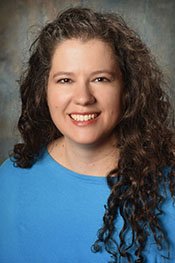Catherine L. Neary, Ph.D.
 Assistant Professor
Assistant Professor
Science Center 313/314
Phone: 856-566-6373; Fax: 856 566-6291
nearycl@rowan.edu
Education
Thomas Jefferson University, Philadelphia, PA
Ph.D. (Pathology and Cell Biology), 2000
Purdue University, West Lafayatte, IN
B.S. (Biological Sciences), 1994
Research Interests
Altered organelle function initiates a cell stress response; failure of this stress response results in the coordinated disassembly of the cell, known as apoptotic cell death. My interest is how metabolic stress affects the initiation of cell death, and how organelles, specifically the mitochondria and cytoskeleton, communicate during the death process. Additional projects in my laboratory include assessing the role of lactic acid metabolism in mitochondrial function, as well as cancer cell dependence on abnormal AMP-dependent kinase (AMPK) activation.
Recent Publications
- Neary, C.L. and J.G. Pastorino. Akt Inhibition Promotes Hexokinase 2 Redistribution and Glucose Uptake in Cancer Cells. Journal of Cellular Physiology (2013) 228: 1943-1948.
- Neary, C.L., and J.G. Pastorino. Nucleocytoplasmic shuttling of hexokinase II in a cancer cell. Biochemical and Biophysical Research Communications (2010) 394(4):1075-1081.
- Gupta, S., Cuffe, L., Szegezdi, E., Logue, S.E., Neary, C., Healy, S., and A. Samali. Mechanisms of ER stress-mediated mitochondrial membrane permeabilization. International Journal of Cell Biology (2010) 2010:170215.
- Neary, C.L., Nesterova, M., Cho, Y.S., Cheadle, C., Becker, K., and Y.S. Cho-Chung. Protein Kinase A isozyme switching: eliciting differential cAMP signaling and tumor reversion. Oncogene (2004) 23(54):8847-56.
- Bree, R.T., Neary, C., Samali, A., and N.F. Lowndes. The switch from survival responses to apoptosis after chromosomal breaks. DNA Repair (Amst). (2004) 3(8-9):989-95.
- Cho, Y.S., Kim, M.K., Cheadle, C., Neary, C., Park Y.G., Becker, K.G., and Y.S. Cho-Chung. A genomic-scale view of the cAMP response element-enhancer decoy: a tumor target-based genetic tool. Proceedings of the National Academy of the Sciences, U.S.A. (2002) 99:15626-31.
- Cho-Chung, Y.S., Nesterova, M., Becker, K.G., Srivastava, R., Park Y.G., Lee, Y.N., Cho, Y.S., Kim, M.K., Neary, C., and C. Cheadle. Dissecting the circuitry of protein kinase A and cAMP signaling in cancer genesis: antisense, microarray, gene overexpression, and transcription factor decoy. Annals of the N.Y. Academy of the Sciences (2002) 968:22-36.
- Neary, C.L. and Y.S. Cho-Chung. Nuclear Translocation of the Catalytic Subunit of Protein Kinase A Induced by an Antisense Oligonucleotide Directed Against the RIα Subunit. Oncogene (2001) 20:8019-8024.
- Cho, Y.S., Kim, M.K., Cheadle, C., Neary, C., Becker, K.G., and Y.S. Cho-Chung. Antisense DNAs as Multisite Genomic Modulators Identified By DNA Microarray. Proceedings of the National Academy of the Sciences, U.S.A. (2001) 98:9819-9823.



